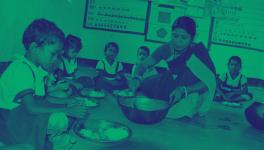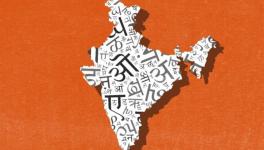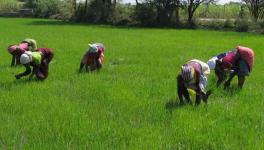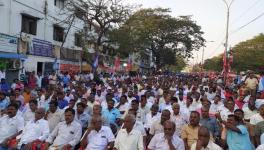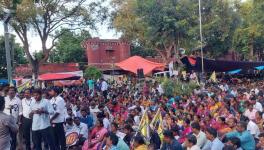TN: COVID-19 Illiteracy Persists as Cases Spread to Interiors, Community Comes to Aide
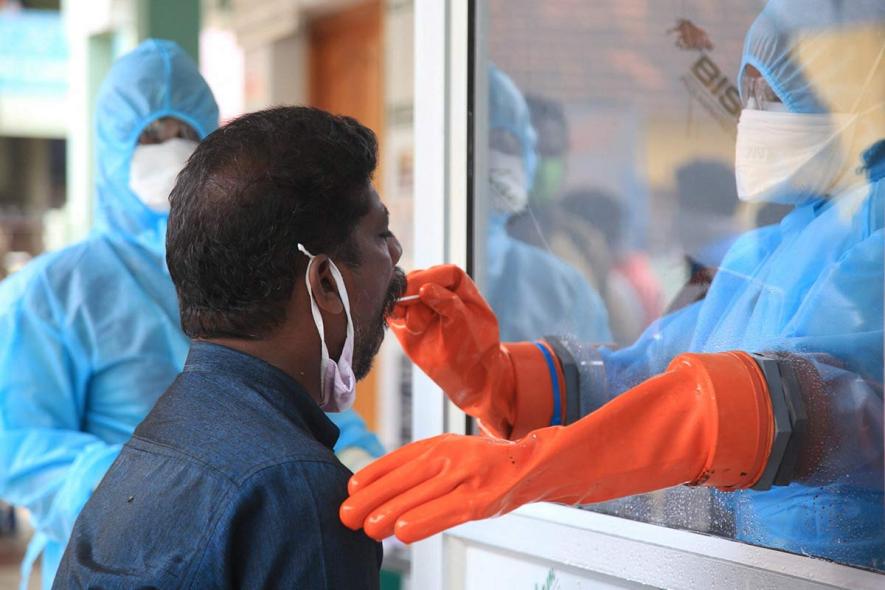
Representational Image. Image Courtesy: PTI
As per the daily bulletin of the state government, almost all the districts of Tamil Nadu have already witnessed their peaks in this wave of COVID-19 and are already on the downward slope. Western districts of Coimbatore, Erode, Salem and Tiruppur, and Chennai continue to report maximum infections.
Coimbatore has been reporting the maximum number of cases and deaths in the state; the count stood at 2,439 infections and 44 deaths on June 8. However, Erode surpassed Chennai, the biggest metropolis in the state, and reported 1,596 cases on the same day. In Chennai, 1,437 fresh infections and 42 deaths were reported, followed by Tiruppur which reported 995 cases and Salem reported 975 infections.
Further, the lack of access to reliable COVID-19 related information including vaccine availability and fever camp venues in Erode has come under criticism.
The two greater corporations of Chennai and Coimbatore have fared better. Poor access to information and medical illiteracy looms over the rural and semi-rural areas, making it difficult to tackle the virus. Government hospitals in rural areas either have only a handful or no beds that are oxygen-equipped, leaving COVID-19 positive villagers with no option but to head to nearby urban centres for treatment.
The number of COVID-19 cases continued to fall in Tamil Nadu this week, with 18,023 fresh cases reported on June 8. However, the state is once again the highest contributor to the country’s daily caseload. The number of deaths due to the infection fell to 409.
SHAME AND STIGMA CONTINUES
WEAVERS COLONY UNDER LOCK
Chennimalai, a town in Erode district, popularly known as the 'handloom town' is home to a society of 1,010 individual houses, one of the largest weavers’ colonies in Asia. Recently, it was cut off from the rest of town upon being identified as a COVID-19 hotspot.
Viji, a resident of the colony, said, “Three days back the colony was shut off from the other areas, policemen are posted at the check-post containing movement in and out of our housing society.”
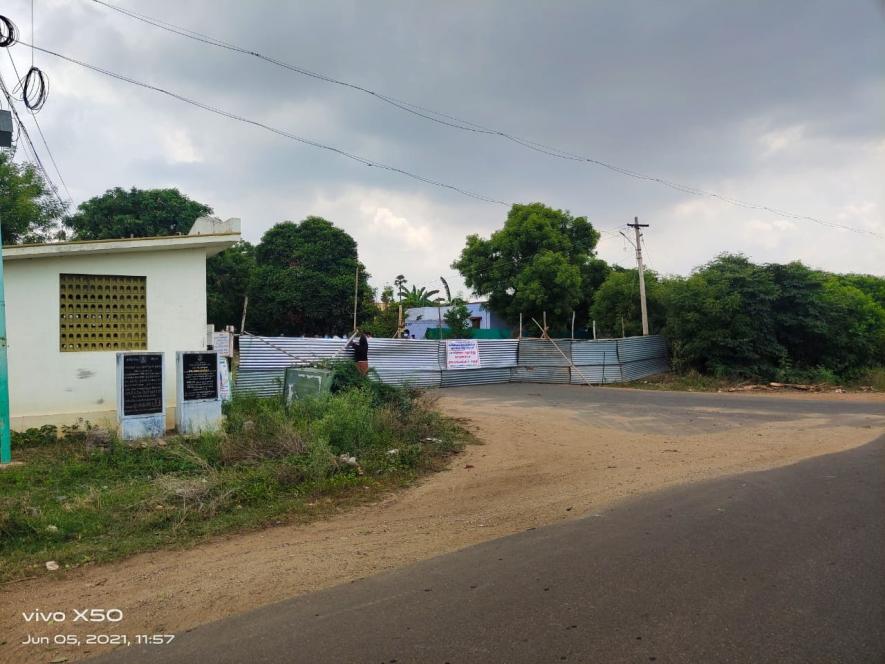
The Weavers’ Colony sealed off to contain COVID-19 spread
As for the possible cause for the high number of cases, he said, “People did not take COVID-19 symptoms seriously and sidelined them as common cold. They delayed check-ups even though they were scared of the virus. There have been six deaths in the recent past.” He further added that, “People think that to be diagnosed with corona is something filthy and associated with shame; so even those who tested positive were out on the streets and going about everyday work without isolating themselves.”
He also stated that even though “two COVID testing booths have been set up in the locality, people are hesitant to get tested as they are afraid they would test positive”.
YOUTH TARGETTED FOR TESTING POSITIVE
Puducherry Science Forum activist Ramesh shows that there is a relative difference between the way developed regions and rural areas respond to the pandemic. He said that a young man from Royapettai, a village panchayat in Vanur block, Villupuram, district was targeted for doing the right thing upon testing COVID-19 positive.
Also read: TN This Week: Mounting COVID-19 Cases and Deaths, Medical Facilities Overwhelmed
He said “As soon as the man tested positive, he admitted himself in a COVID-19 care centre keeping in mind his two young children and old father. He did not shy away from the disease. However, upon realising he tested positive, the villagers accused him of spreading the infection. The fact of the matter is that many others had COVID-19 symptoms, but they refused to get tested because of the severe stigma associated with it.”
Auroville is an international township in Villupuram district which is reportedly handling the COVID-19 disease fairly well.
‘MEDICAL ILLITERACY A BIG PROBLEM’
Dr. G K Kalaiselvan, a private medical practitioner in Erode and an activist of Viduthalai Chiruthaigal Katchi, said, “Rural areas and urban slums are the worst affected. The problem is that people are medically and scientifically illiterate. They think they won’t get infected, they take it lightly. They may even be educated and have a degree, but the attitude is the same.”
He added, “The first wave of COVID-19 was not so severe. People are realising the seriousness of the virus only after someone dies in their families. We witnessed the true pandemic situation only last month.”
Also read: TN: Unscientific Measures and Propaganda Muddling Fight against COVID-19
When asked about what effects the lack of proper knowledge has on people, he said, “I have received patients who drank a lot of ‘kabasura kudineer’ thinking it will save them from COVID-19, but they turned up with stomach ulcers.” Kabasura kudineer is a Siddha concoction that has become popular during the pandemic.
‘NEW GOVT HAS DONE WELL’
Many medical doctors and on-ground activists involved in the fight against COVID-19 have said that the newly formed government has been fast to act. They say that it has taken many measures to identify infections and has expanded health infrastructure.
Dr Thirunavukarasu, Assistant Professor of Microbiology at the government hospital in Salem, who is also associated with the Tamil Nadu Science Forum (TNSF), said, “Many COVID-19 Care Centres have come up, and they are facilitated with portable oxygen supply.”
He also said, “In urban areas, volunteers were working in full swing visiting people door-to-door. Those showing COVID-19 symptoms and exposed to the virus were referred to the swab test tables set up in their locality. In rural areas, auto rickshaws with medical staff were sent to carry out RT-PCR tests.”
Gowri Shankar, also a TNSF activist, said, “Kunnathur, Uthukuli and Avinasi are rural localities in Tirupur that were the worst affected by the virus, but Taluka level interventions were made to bring the situation under check.”
“TNSF ran a helpline and more than 1,000 people contacted us in the past few weeks. We have provided the necessary help,” he said.
He also added that “Because cases have dropped, testing has reduced over the past few days, that should not be the case. Existing fever camps should also continue.”
Shankar pointed out the efforts taken by the Democratic Youth Federation of India (DYFI). It tied up with the Tiruppur Corporation to provide ambulance and food service to COVID-19 patients. DYFI also donated a refrigerator for storing blood and cylinders for transporting medical oxygen to the corporation, he said.
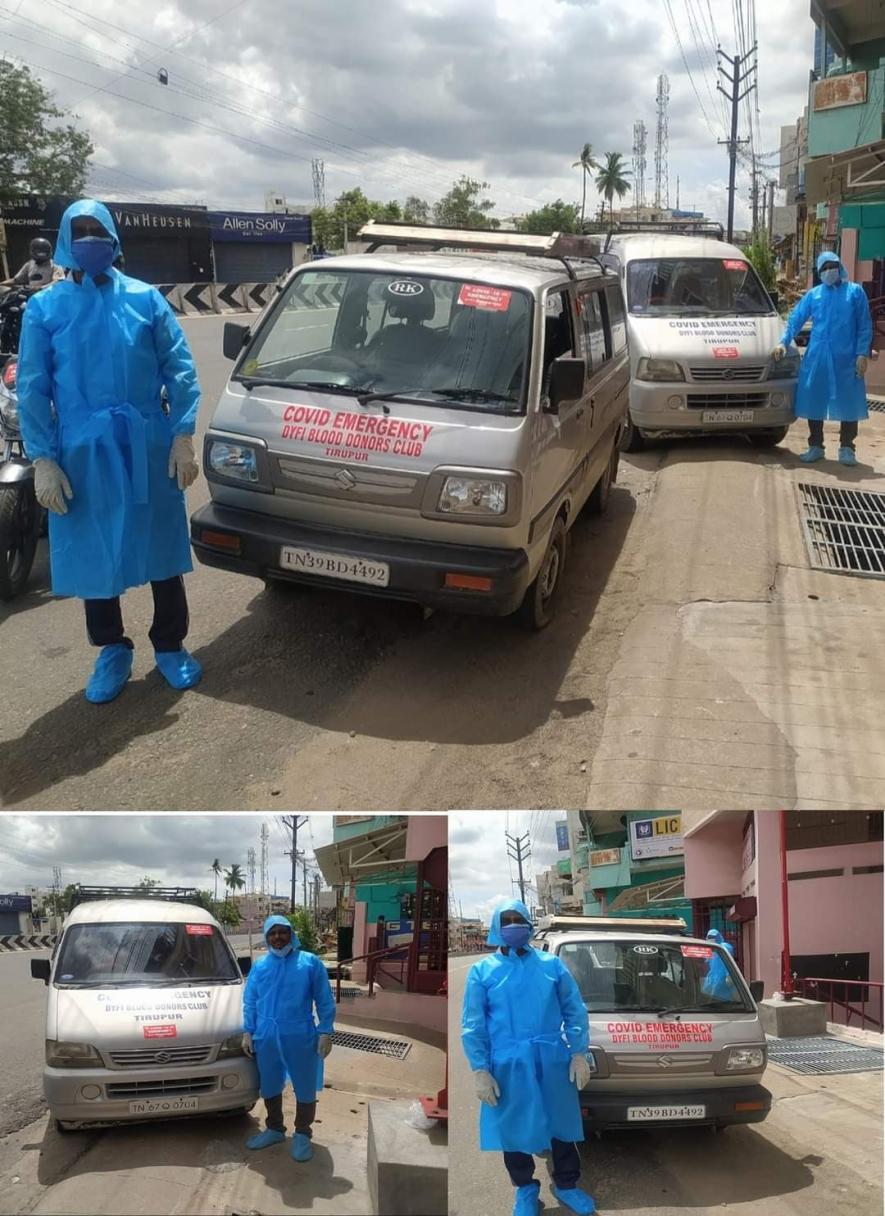
DYFI, Tiruppur activists helping fight COVID-19
However, those who NewsClick spoke with across Western districts are saying that with the increased number of cases in the past month, containment and sanitation measures were not taken as seriously as the previous year. It is cited as a lacuna in the fight against COVID-19.
Get the latest reports & analysis with people's perspective on Protests, movements & deep analytical videos, discussions of the current affairs in your Telegram app. Subscribe to NewsClick's Telegram channel & get Real-Time updates on stories, as they get published on our website.













